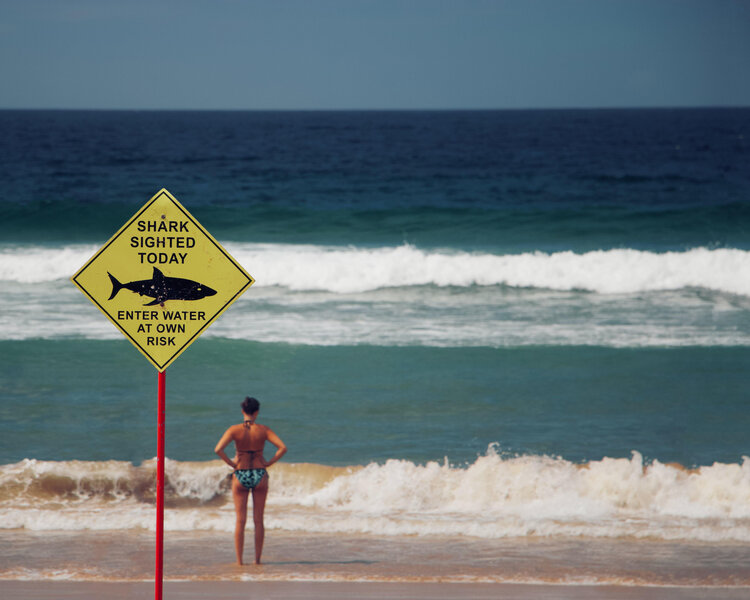Disclaimer: If you are like me, you find that some days, it is easy to be clear and know what you need, but other days feel like completely uncharted territory. Right now, we are all learning new skills. Depending on the day, you might feel like you are surviving, thriving or somewhere in between.
“We are all in the same storm, with different boats and different equipment.” Unknown
In this time of uncertainty, our brains are actively seeking factual, reliable information to help us navigate the waters of the coronavirus. Right now, we can’t figure out the type of “water” we are swimming in—is it treacherous or safe? Is it calm or scary? The answers are unclear and they can change by day, sometimes even by hour.
The mixed messages we receive make it difficult for us to develop an effective response plan. As businesses have re-opened, we no longer have black-and-white guidelines to follow. We are living in a grey zone—a place of uncertainty and unknowns about what activities are safe. One news channel might tell us it’s not safe to go outside; another might tell us it’s time to dine at restaurants or schedule a family vacation. Similarly, we hear masks are mandatory, but then drive around and see people shopping at businesses without masks. Mixed messages leave us in a quandary.
As humans, we rely and thrive so much on certainty that our brains go to great lengths to alleviate tension. We long for certainty, even if our actions create aversive situations. For example, research studies have shown that we would rather receive an electronic shock all the time as opposed to knowing we have a 50% chance of getting shocked. Similarly, we would rather lose our job than know that we might be at risk of losing our job. Uncertainty provides fertile ground for us to feel discombobulated and messes up our normal rhythms.
How do we manage? What tools can we use to tread through these “unknown waters”?
Recognize that this is not normal. We are not expected to navigate this seamlessly. We have never had to deal with a situation like this, and we haven’t had a chance to develop our “new” skills. Give yourself a break. Remind yourself that you will get through this time.
Listen to your body. Take notes. Identify triggers and situations that create physiological symptoms. Our bodies are smart. Often, they are the truth tellers. We can talk ourselves out of our thoughts and rationalize all day, but our bodies do not lie. A physiological reaction is indicative that something isn’t right, and we need to listen.
Identify your needs and set boundaries. The word boundary can sometimes evoke a negative reaction. Think of a boundary as freedom. Honoring your values. Being clear about where you stand. Realize that you might not know your needs right now. That is part of the problem. We are confused about where our own needs are and what we feel is safe. Also, your needs might change. For example, you might feel comfortable with a decision one day but find yourself uncomfortable with it the next day. That is okay. Honor where you are and go with it. Give yourself room to change. Your boundaries only need to make sense to you. No one else.
Focus on assertive communication. Normally, you might be an expert communicator, but guess what? The rules have changed. You’ve got to give yourself a second to learn how to communicate in this new environment.
What used to be simple situations—such as organizing a playdate—have become complicated. This makes sense. We are in uncharted territory. We know other people’s health is at risk, but we don’t know to what extent. I’ve had many conversations lately with clients who have found it difficult to figure out ways to talk with other parents about where they are with social distancing, masks, etc.
Make it easy and clear. For example, you can say, “This is our current view on social distancing…What is yours?” I recently had a friend who texted me and said, “We’ve only been around 2 other people and we have masks. Just letting you kow where we are.” We then talked, realized we were on the same page with social distancing and were able to identify parameters we were both comfortable with: outside play and kids wearing masks if they got closer than 6 feet. If you don’t agree with a situation, whether it be a playdate, a sporting game, or a group activity, that is okay. Make an effort to communicate it clearly to the other person, in a non-judgmental manner. Sometimes, making a joke can help clear the air and allow a natural end to the conversation.
Another situation my clients keep encountering includes not wanting to participate in optional virtual and/or physical gatherings. Right now, many people are unable to easily say, “I have plans.” However, you can respond by saying that you aren’t going to be able to make it, that it won’t work out with your schedule, etc. By the way, “plans” can be watching television or taking a nap.
Lastly, and most importantly, be kind to yourself. Give yourself grace and space to swim through the currents.
After this post, I will be taking a break to work on some new programs I’m developing.
I’ll be back…and look forward to sharing my new projects with you.
Until next time…
-Rachel



